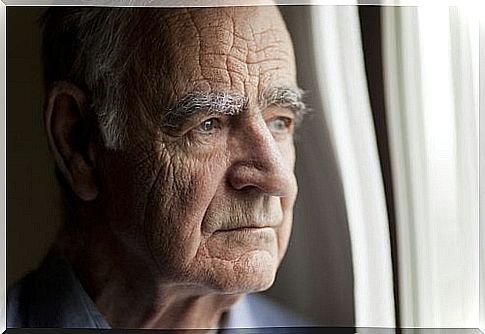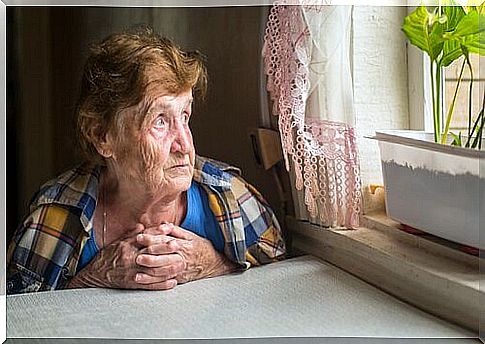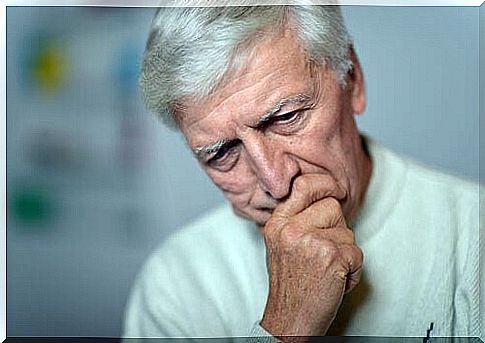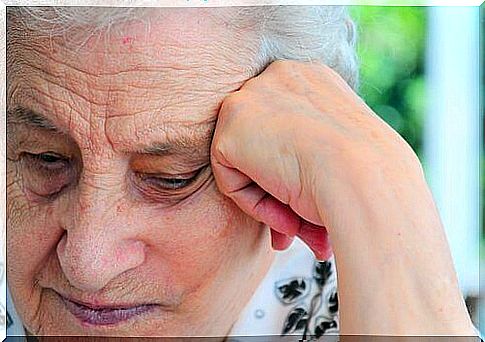The Elderly And Depression: How To Spot It In Time?

For several reasons, people over the age of 60 can develop different episodes of depression. Feelings of sadness, frustration or anger change the daily life of the elderly.
In this article, we explain how to spot a mental disorder of this type in time.
Depression in the elderly: what to know

Once retired, many people feel worthless or believe that life no longer makes sense. These thoughts lead them to get depressed and not enjoy the years they have left to live (which can be 10, 15, 20…).
Depression in the elderly is very common, even if it is not part of the natural aging process.
It may depend on recent changes, whether you are entitled to your own pension or not, on the relationship with your family and on the activities you can do.
Lifestyle changes from the age of 60 are truly remarkable.
For example, you stop going to work Monday through Friday and stick to a schedule and get up early to stay home without much to do.
In addition, some situations can promote greater depression:
- Leaving your home (to move to a smaller apartment or shared with your children)
- Go to live in a retirement home
- Chronic pain or severe illness
- Death of spouse, siblings or close friends
- Loss of independence
- Lack of obligations
- Few activities available
- Economic problems (changing the lifestyle you used to be)
Depression in old age is not always taken into consideration by those around the elderly. Symptoms are underestimated as temporary or the whims of an elderly person.
However, feeling negative emotions for a long time can cause physical illness and, in some cases, you even stop eating or think about ending your life.
It is equally important to know that the elderly person can become depressed after discovering that they have a disease.
This happens, for example, if you diagnose a tumor, Parkinson’s, a principle of dementia, etc. The picture can get worse if you take certain medications (such as sleeping pills) or excess alcoholic beverages.
How to spot depression in the elderly?

Imagine ourselves elderly, retired and with white hair, in the company of our great love in a beautiful house by the sea or in the mountains, reading the newspaper in a rocking chair and receiving periodic visits from children and grandchildren.
However, unfortunately, reality does not always resemble this idyllic story …
Perhaps we will be forced to go to a retirement home because our family members cannot take care of us, perhaps our spouse is dead or sick and the physical pains we experience do not allow us to even move to the front door (even less for carry out any other activity).
The aging process is for many the worst phase of their life.
Losing friends and loved ones, feeling inferior or helpless and worthless to society are great changes for a person.
This is why depression is so common.
Children or grandchildren can identify the early symptoms of this mental disorder and help the elderly to understand that life is not over yet and that they still have much to enjoy.

Among the main symptoms that indicate a depression of this type, we find long-lasting feelings of sadness and despondency (perhaps weeks), the loss of interest in activities that were carried out before retirement and the lack of satisfaction or pleasure for basic activities.
On the other hand, the elderly may also try:
- More fatigue and tiredness than usual, even if you don’t do any heavy activity.
- Loss of appetite (and consequently weight loss).
- Desire for isolation.
- Difficulty falling asleep (in old age you sleep much less: about 4 hours a night).
There are other symptoms that we can identify in our parents or grandparents: feelings of inferiority, guilt or self-doubt, suicidal thoughts or strange behaviors that they have never had before.
What to do if an elderly person suffers from depression?
As a first measure it is necessary to remember that old age is a phase of life that we cannot avoid. Vile feelings don’t have to be part of this period which, like others, has positive and other negative aspects.
Physical or economic limitations are two reasons for the depression of old age.
- To overcome the first problem, you can choose activities or tasks according to your conditions.
- For the second, one should not be ashamed to ask family members for help. It’s a great way to “give back” everything your parent or grandparent gave us.
On the other hand, family members cannot impose or oblige the elderly person to carry out any activity that he does not want. Diplomacy in these cases works very well. Unless he is putting his life at risk or the person is very ill, it is good to let him decide for himself.
And, of course, accompany her and don’t leave her alone for a long time (visit her once a week, for example).









